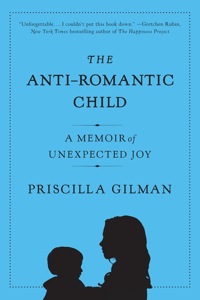I’ve been given the opportunity to review the book The Anti-Romantic Child: a Memoir of Unexpected Joy by Priscilla Gilman. Gilman describes it as “a story about identity: its fragility, its poignancy, its difficult forging, its flowering, its ultimate ineffability.” I would add that it’s about expectations and how they change, and maintaining the personhood while addressing the disability.
The book opens shortly after the birth of the author’s first son, Benjamin, and then quickly backtracks into a history of the author’s life up until that point: her relationship with her father, love of literature (she teaches the subject at Yale and Vassar after earning her PhD), and early relationship/marriage to Richard. Gilman has had a privileged, magical childhood and has a passion for the poetry of Wordsworth. She and Richard have romantic notions of what parenthood will be like, and the bulk of the book focuses on her coming to terms with a child and a life so very different than what she had imagined for herself.
Overall, I enjoyed the book. The first 30 or so pages were extremely difficult to get through however. I was actually surprised when I paged through the book a second time to realize the descriptions of the author’s life before Benjamin only lasted that long. The frequent Wordsworth citations created more of a research paper feel than that of a memoir and were distracting. I also found it difficult to relate to Ms. Gilman. Although not perfect, her upbringing carried many privileges that most do not experience. While this is not a problem in and of itself, I felt the author described them as though she felt readers should automatically relate, which was off-putting.
Past that point, the book really picked up for me. I saw glimpses of the Menininho in “Benj,” particularly in terms of sensory processing. The change of expectations, concerns about peers and schools, the difficulties and beauty in the relationship between Benj and his brother James all resonated with me. Although our stories are different, these themes are common amongst special needs families no matter the diagnosis (or lack thereof; Ms. Gilman and Richard never pursue a formal diagnosis for their son). As I was reading, I felt all the emotions she was describing.
To put it another way, Gilman is someone I’d love to have dinner with and have a conversation about her experiences, but probably not hear a lecture from. Parts of her book, particularly the beginning, felt a bit stiff…like a lecture. Luckily, most of the memoir was more relaxed and intimate. There were many times I wanted to put my arm around her shoulder and tell her it would be ok, or to exclaim “I see the same thing with M!”
I wouldn’t classify this as a quick, easy read…it’s not a “grab it on your way out the door so you have a fun read sitting poolside” type of book. I’d recommend it first and foremost for parents who have a child with hyperlexia, sensory issues, or intense anxiety and want to learn how another family helped their son grapple with difficulties. And, more than any other special needs parenting memoir I’ve read, I think this makes a terrific book for a book club. Gilman raises so many discussion points that just couldn’t be done justice in this book (that wasn’t the point of the book, after all): another reason for wanting to sit down and have a conversation with her! Possible book club topics could include the “need” for labeling in this country and the pros and cons of not seeking a diagnosis label, whether society prefers to accommodate (or even romanticizes) some disabilities over others, how to strike a balance between addressing our child’s deficits and celebrating his differences (all without trying to “fix” him) and how we, as parents, handle the change in our expectations of not only our children but ourselves once our child receives a diagnosis.
In fact, if any of you would like to have a little informal “book group” meeting about this book, let me know. I’d love to discuss it with you! The Anti-Romantic Child is available wherever books are sold.
* I received a copy of this book from the publisher and TLC Book Tours in order to conduct my review. I received no other compensation and all opinions are my own.


4 Comments
Leave a reply →